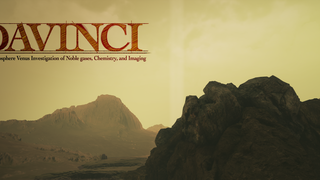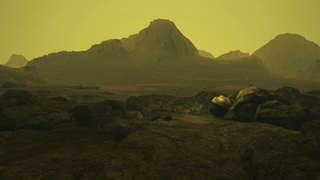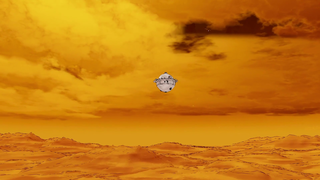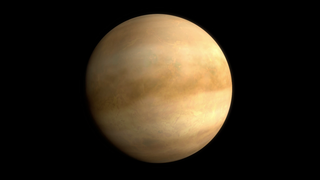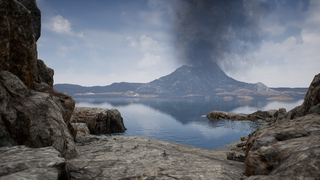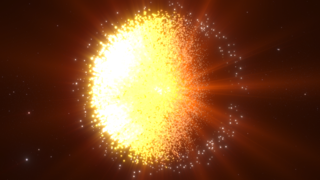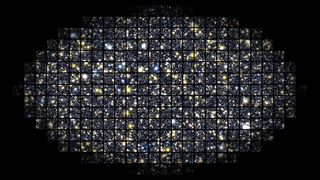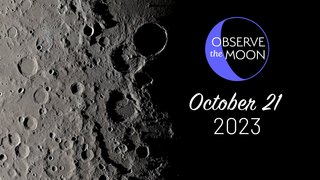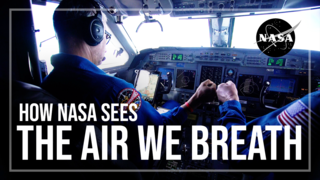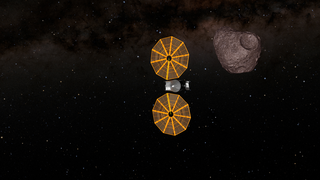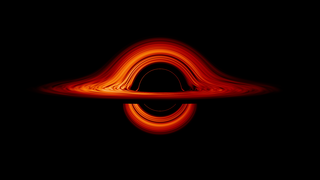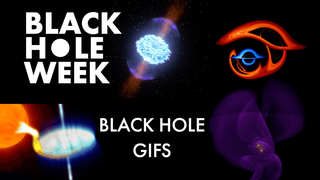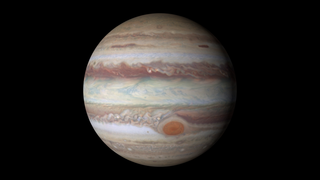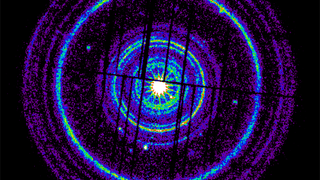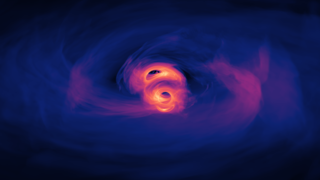Planets and Moons
ID: 14346
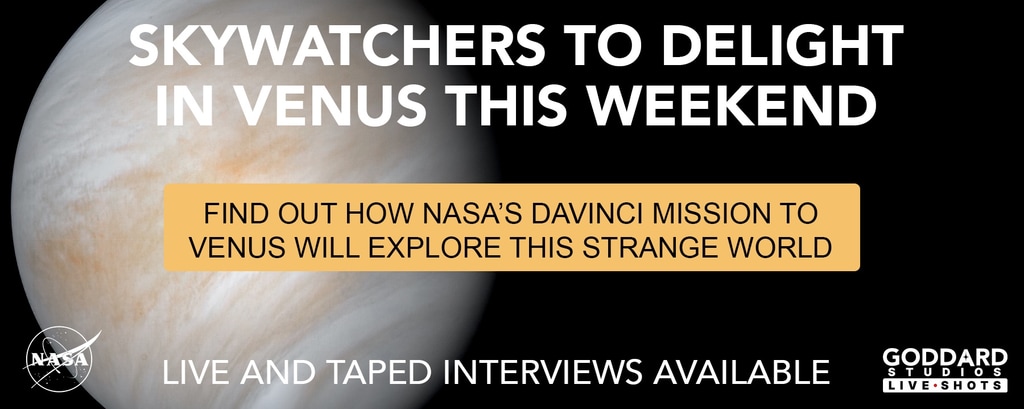
NASA’s Upcoming DAVINCI Mission Will Take The Plunge into Venus’s Hellish Atmosphere
Shine bright like a diamond! You may have noticed a bright looking “star” in the night sky just after dusk recently. Well, it’s not a “star”, but rather Venus, Earth’s sister planet. Next weekend, on June 4, Venus will be at its highest point in the sky, leading to a spectacular evening of viewing.
Today Venus is the hottest planet in the solar system. It’s a hellish world with surface temperatures hot enough to melt lead, but billions of years ago it may have looked similar to Earth with liquid water oceans and perhaps a steamy atmosphere. How Venus turned into this toxic world remains a mystery. NASA’s upcoming mission to the planet, DAVINCI, will help find answers. DAVINCI will plunge through Venus’s thick, toxic atmosphere collecting unprecedented detail and information about the planet as it parachutes through the thick clouds and lands in an ancient region. Who knows what fabulous mysteries of our sister planet remain on the surface of Venus!
Click here for more information about Venus and DAVINCI: https://solarsystem.nasa.gov/planets/venus/overview/ and https://ssed.gsfc.nasa.gov/davinci/
* Live interviews are available Friday, June. 2 from 6:00 a.m.- 1:00 p.m. EST
* Click here to request an interview: https://forms.gle/jBJv4fDZKDqwZ5ax8
* Requests sent via the above form will have scheduling priority. Please do not email requests.
Suggested Anchor Intro:
This weekend is a great time to go outside and enjoy the views of our nearest planetary neighbor. Venus will be at its highest point in the night sky, giving us dazzling views of our sister planet. It’s a fascinating world - similar in size and terrain to Earth - but also vastly different. The future of Venus exploration is nearly upon us with NASA’s upcoming DAVINCI mission. Here to tell us more about this exciting new era is NASA expert….
Suggested Questions:
This weekend is a great time to go outside and catch Venus sparkling in the evening sky. How can we spot our planetary neighbor?
Venus is often called “Earth’s twin” given its similar size and rocky landscapes, but it is a very different world than our own. Can you tell us more about this mysterious world?
What are NASA’s plans to explore Venus in the coming years?
What about the DAVINCI mission are you most excited about?
Getting to any planet is difficult, but Venus is especially hard given its extreme temperatures and pressure. How do you build something that can survive in a place like this?
Where can we go to learn more about Venus and this exciting mission, and all of NASA’s plans for returning to Venus?
Questions for longer interviews
How does Venus help us understand planets orbiting other stars?
Why must we “take the plunge” to measure how Venus' atmosphere and climate operate?
Venus is a cautionary tale of what can happen when you have runaway greenhouse gasses that feed the cycle of planetary warming. How can these new missions help us better understand Earth?
Recent studies indicate that Venus may still have active volcanoes! What does this tell you about Venus?
Do you have feedback for the Live Shot Program or want to be removed from our contact list? We would love to hear from you HERE!
Skywatchers Delight! Venus Will Dazzle In The Night Sky Next Weekend! NASA’s Upcoming DAVINCI Mission Will Take The Plunge into Venus’s Hellish Atmosphere Live Shots

Shine bright like a diamond! You may have noticed a bright looking “star” in the night sky just after dusk recently. Well, it’s not a “star”, but rather Venus, Earth’s sister planet. Next weekend, on June 4, Venus will be at its highest point in the sky, leading to a spectacular evening of viewing.
Today Venus is the hottest planet in the solar system. It’s a hellish world with surface temperatures hot enough to melt lead, but billions of years ago it may have looked similar to Earth with liquid water oceans and perhaps a steamy atmosphere. How Venus turned into this toxic world remains a mystery. NASA’s upcoming mission to the planet, DAVINCI, will help find answers. DAVINCI will plunge through Venus’s thick, toxic atmosphere collecting unprecedented detail and information about the planet as it parachutes through the thick clouds and lands in an ancient region. Who knows what fabulous mysteries of our sister planet remain on the surface of Venus!
Click here for more information about Venus and DAVINCI: https://solarsystem.nasa.gov/planets/venus/overview/ and https://ssed.gsfc.nasa.gov/davinci/
* Live interviews are available Friday, June. 2 from 6:00 a.m.- 1:00 p.m. EST
* Click here to request an interview: https://forms.gle/jBJv4fDZKDqwZ5ax8
* Requests sent via the above form will have scheduling priority. Please do not email requests.
Suggested Anchor Intro:
This weekend is a great time to go outside and enjoy the views of our nearest planetary neighbor. Venus will be at its highest point in the night sky, giving us dazzling views of our sister planet. It’s a fascinating world - similar in size and terrain to Earth - but also vastly different. The future of Venus exploration is nearly upon us with NASA’s upcoming DAVINCI mission. Here to tell us more about this exciting new era is NASA expert….
Suggested Questions:
This weekend is a great time to go outside and catch Venus sparkling in the evening sky. How can we spot our planetary neighbor?
Venus is often called “Earth’s twin” given its similar size and rocky landscapes, but it is a very different world than our own. Can you tell us more about this mysterious world?
What are NASA’s plans to explore Venus in the coming years?
What about the DAVINCI mission are you most excited about?
Getting to any planet is difficult, but Venus is especially hard given its extreme temperatures and pressure. How do you build something that can survive in a place like this?
Where can we go to learn more about Venus and this exciting mission, and all of NASA’s plans for returning to Venus?
Questions for longer interviews
How does Venus help us understand planets orbiting other stars?
Why must we “take the plunge” to measure how Venus' atmosphere and climate operate?
Venus is a cautionary tale of what can happen when you have runaway greenhouse gasses that feed the cycle of planetary warming. How can these new missions help us better understand Earth?
Recent studies indicate that Venus may still have active volcanoes! What does this tell you about Venus?
Do you have feedback for the Live Shot Program or want to be removed from our contact list? We would love to hear from you HERE!
Related
Credits
Michelle Handleman (KBR Wyle Services, LLC): Lead Producer
Aaron E. Lepsch (ADNET Systems, Inc.): Technical Support
Michael Starobin (KBR Wyle Services, LLC): Producer
Christina Brooke Mitchell (KBR Wyle Services, LLC): Producer
Angel Kumari (NASA/GSFC): Lead Producer
Michael Randazzo (Advocates in Manpower Management, Inc.): Lead Editor
James Garvin (NASA, Chief Scientist Goddard): Lead Scientist
Aaron E. Lepsch (ADNET Systems, Inc.): Technical Support
Michael Starobin (KBR Wyle Services, LLC): Producer
Christina Brooke Mitchell (KBR Wyle Services, LLC): Producer
Angel Kumari (NASA/GSFC): Lead Producer
Michael Randazzo (Advocates in Manpower Management, Inc.): Lead Editor
James Garvin (NASA, Chief Scientist Goddard): Lead Scientist
Please give credit for this item to:
NASA's Goddard Space Flight Center
NASA's Goddard Space Flight Center
Short URL to share this page:
https://svs.gsfc.nasa.gov/14346
Keywords:
SVS >> Venus
SVS >> Solar System >> Planets >> Venus
NASA Science >> Planets and Moons
SVS >> DAVINCI
https://svs.gsfc.nasa.gov/14346
Keywords:
SVS >> Venus
SVS >> Solar System >> Planets >> Venus
NASA Science >> Planets and Moons
SVS >> DAVINCI
